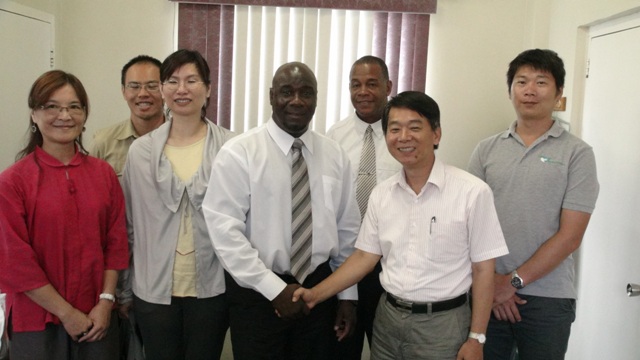Nevis Agriculture Minister welcomes project for safer and better quality produce

(L-R back row) Specialist Mario Cheng, Permanent Secretary in the Ministry of Agriculture on Nevis Eric Evelyn, Specialist Yu-Ming Lu. (L-R front row) Senior Entomologist and Director of the Taiwan Agricultural Research Institute Ching-Hua Kao, Hsuch-Jong Tang, Minister of Agriculture Hon. Alexis Jeffers shakes hands with team leader and Project Manager of the Vegetable Fruit and Upland Crop Quality and Safety Improvement Project in St. Kitts and Nevis Fernando Cheng-ChingYeh
NIA CHARLESTOWN NEVIS (May 27, 2014) –Minister of Agriculture in the Nevis Island Administration (NIA) Hon. Alexis Jeffers welcomed a delegation, from the Republic of China on Taiwan, who plan to assist farmers in St. Kitts and Nevis through a Vegetable, Fruit and Upland Crop Quality and Safety Improvement Project, designed to provide safer and better quality produce to locals and visitors alike.
During a meeting at his Charlestown Office on May 22, 2014, with the five-member delegation, Mr. Jeffers welcomed the project and acknowledged that it would be of significant benefit to the island’s farmers.
“This particular project, I believe, would have tremendous benefits to the farmers and people of Nevis and also St. Kitts as well but more specifically to Nevis…Based on what you have just heard mentioned, the project would of course have tremendous benefits in terms of the speediness and the quickness in which vegetables can be tested. If I am correct, you said within hours you can have results.
“We have always talked about food security, food safety and indeed pesticides and the control of our pesticides and also the testing of vegetables is important if we are to achieve our goal of providing or maintaining and getting to that level where we can say we are quite secured and safe with our food products here on the island of Nevis,” he said.
Mr. Jeffers also spoke of two persons, one for Nevis and another from St. Kitts, who would benefit come from the four-year, two-phase project.
“Based on what we have discussed and based on what you are hoping to achieve with this project over the next four years, I do believe that we can look back from today and see where we would have gotten to in four years’ time with your assistance and with your cooperation.
“I believe you said that two persons would be selected, one from St. Kitts and perhaps one from Nevis as well, to go to Taiwan for possible training. Training is important in that, once it is had, it can be passed on to other persons as well and we continue that cycle,” he said.
In conclusion, the Agriculture Minister expressed gratitude to the delegation for their partnership with the NIA in its quest for food safety and security in Nevis.
Meantime, Project Manager Fernando Chang-ChingYeh gave an insight into the project.
“Our project has two wings. The primary objective for hardware, we want to establish a soil fertility analysis laboratory and establish a pesticide-residue detection laboratory.These two laboratories will provide service to farmers and let farmers know how to use their fertiliser and how to increase the product quality and safety…
“We also have software capacity building…Mario Cheng, he is no stranger. Actually, he stayed in St. Kitts and Nevis four years already and we have …two experts who flew especially from Taiwan to here, more than 10,000 miles, I believe. Ms. Kao is a director of the TARI(Taiwan Agriculture Research Institute). She is the specialist. She majored in Pesticide Residue Detection, since 1985 TARI, with the Rapid Bioassay of Pesticide Residues (RBPR). This technique is a unique technique tailored by Taiwan. We want to bring this technique here,” he said.
The RBPR was developed by the TARI in 1985 as a low-cost alternative to chemical analysis in an effort to achieve quick test results for pesticide residue in order to protect local consumers from contaminated fruits and vegetables. The technology is described as simple with quick detection speed and low expenditure with a clear result in a toxicological sense.
Mr. Chang-ChingYeh compared the RBPR with the existing chemical tests which were available in St. Kitts and Nevis.
“The reason we want you to use RBPR is because it is fast; it is cheap compared with traditional chemical work. If you want to test pesticide residue, it takes about three days to get the results but for us it is simple. Within 10 minutes you can get the results. That’s a big difference and one sample for RBPR will only cost EC$1but for chemical work it will cost at least EC$10. That’s a huge difference because if …there are too many samples to handle, within one year, we must have a very cheap, very fast way, then we have a chance to provide safe products to the consumer including St. Kitts people and also the tourists. I believe this is very important,” he said.
Regarding the soil testing component of the project, the Project Manager said he had visited some farms throughout the Federation and observed that they were in need of that facility.
“Another part is soil fertility analysis. We visited a lot of farmers and we also got the same response from them. They indeed need this kind of analysis catered to them, to recommend to them how to use fertiliser.
“So this project actually, we believe by the end of this year when we finish building our laboratories, establish building we can provide this free service to farmers. This is a major objective,” he said and expressed hope, that with the help of the project would come increased farmers’ income and a 10 percent higher crop yield.
